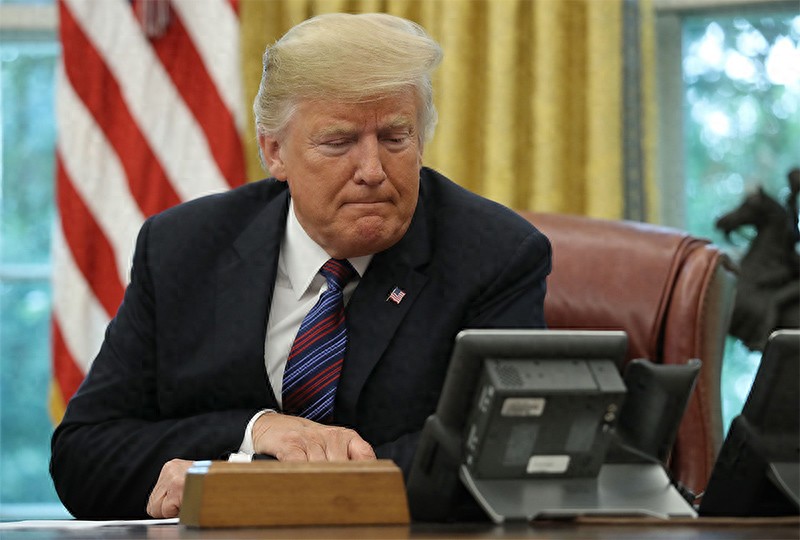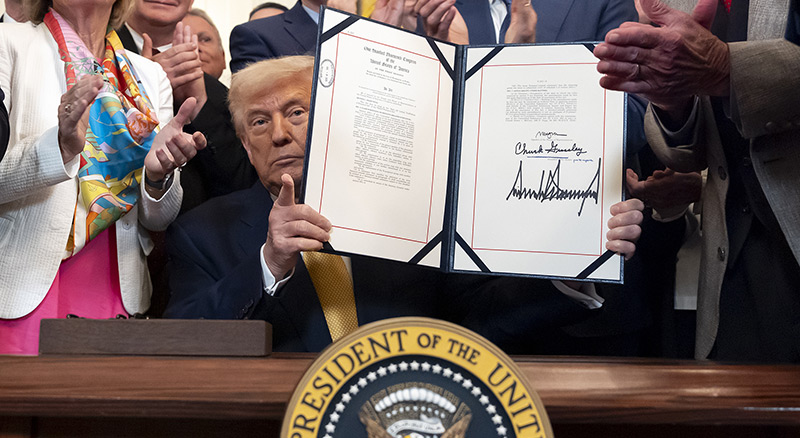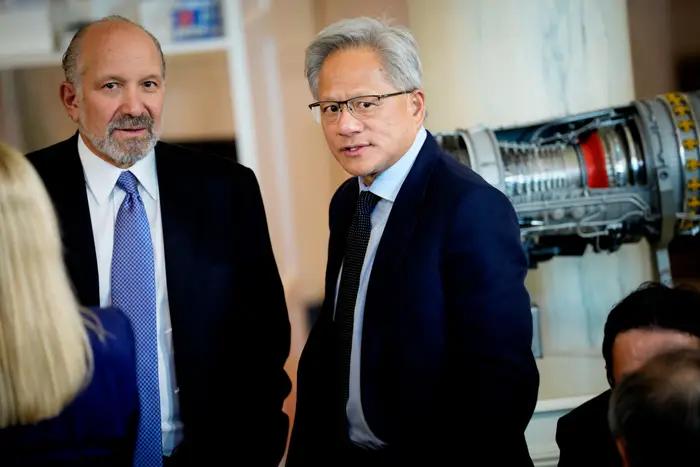【By Observer Net, Xiong Chaoran】"Some sources said that during meetings with aides, Trump was often the least hawkish on China in the room."
On July 16 local time, Bloomberg reported, citing sources who have knowledge of the situation, that in an effort to achieve a summit between the leaders of the United States and China and reach a trade agreement, U.S. President Trump has "softened his tone on China" (Softens Tone on China) and dialed down his confrontational tone with China (has dialed down his confrontational tone with China).
The report noted that since Trump returned to power nearly half a year ago, he no longer constantly talks about the "huge trade deficit between the U.S. and China and the resulting unemployment problems." This posture of lowering his stance contrasts sharply with his continued use of high tariffs to threaten other trading partners. Currently, Trump is not focusing on the so-called "trade imbalance," but rather on reaching procurement agreements similar to those achieved during his first term, and quickly celebrating the "winning" achievements. It should be noted that, with the booming exports, China achieved record trade surpluses in the first half of this year.
However, sources said that Trump's capricious policy strategies and his departure from previously promised tough policies have worried government officials and external advisors. A series of events this week have further exacerbated concerns — the so-called "red lines" set by the U.S. against China have now become negotiable bargaining chips.

Trump waiting for a call in the White House Oval Office, CNN photo
Chip Technology Game, "Huang Renxun receives support from the Trump administration"
On July 15, NVIDIA CEO Huang Renxun announced during his visit to China that after being halted for three months, the Trump administration had approved NVIDIA's sale of H20 chips to the Chinese market. The report said that previously, several senior U.S. officials had stated that this matter was not under discussion, while now this move has overturned the Trump administration's previously declared policy of strictly preventing the most advanced U.S. technologies from flowing into China.
Last month, U.S. Treasury Secretary Beseant, under pressure from Senate lawmakers, had listed the export controls on NVIDIA's H20 chips as evidence of the Trump administration's tough stance toward China.
According to sources, although such exports still require approval, some Trump administration officials have privately opposed issuing licenses and believe this will only boost the development momentum of Chinese tech companies. Others argue that allowing NVIDIA to compete with Chinese enterprises in China is crucial to winning the AI competition with China. According to sources, this view advocated by NVIDIA CEO Huang Renxun has gained increasing support within the Trump administration.
Tariff Trade Disputes, U.S. Treasury Secretary Implies "Continued Truce"
The White House maintains that Trump has final authority over all trade decisions. White House Deputy Press Secretary Kush Desai said that Trump has always been committed to creating a fair competitive environment for American workers and industries, and the government will continue to have productive discussions with all trading partners.
Bloomberg reported that the 90-day tariff truce reached through the Geneva economic and trade talks between the U.S. and China will expire on August 12, and at that time, the previous high tariffs may return. To further ease tensions, U.S. Treasury Secretary Beseant on July 15 hinted that the original deadline for the U.S.-China tariff truce next month is flexible.
"I told market participants not to worry about the date of August 12," Beseant said in an interview with Bloomberg Television, adding that he hopes to meet with Chinese counterparts soon, possibly in a third country, around early August.
A source said that the U.S.-China tariff truce period may be extended by another three months. At the same time, Trump is imposing tariffs on other countries, including America's main allies, and threatening more actions against the pharmaceutical and semiconductor sectors.
Last week (July 11), U.S. Secretary of State Rubio met with Chinese Foreign Minister Wang Yi in Kuala Lumpur. Rubio, who had previously been one of the most ardent "China hawks" in the U.S. Senate, said after the meeting that the conversation was very constructive and positive when addressing the media.
When asked about the possibility of a meeting between the two country's leaders this year, Rubio said "it's very likely," but both sides must "create a good atmosphere and achieve real results."
On China, Trump made "positive statements"
On July 15 local time, U.S. President Trump attended the Pennsylvania Energy and Innovation Summit in Pittsburgh, boasting that the U.S. is in a "real golden age," leading the world in artificial intelligence, with China and other countries trying to catch up. "We won't let them succeed," Trump said, but then added that the U.S. would "fight them in a very friendly way."
On July 16 local time, before officially signing a bill titled "Comprehensive Counter-Fentanyl Trafficking Act" (or simply "the Fentanyl Bill"), Trump spoke about the fentanyl issue in the White House Oval Office, repeating his usual remarks. He again mentioned China, as he has done many times before.
"I think China has been helping us," Trump told reporters: "I mean, fentanyl has been a terrible situation for years, but since I came here, we are talking with them, and they are making big steps (making big steps)... You know they are punished by tariffs because of fentanyl, but they want to do something."
The Hong Kong South China Morning Post reported that day, pointing out that Trump's latest "positive" remarks on China contrasted sharply with his aggressive rhetoric in February when he announced new tariffs on China over the fentanyl issue. At that time, he first announced a 10% tariff on all goods imported from China, and then escalated it to 20%.
However, later that evening, after signing the bill, Trump continued with his usual false accusations: "China provides most of the fentanyl, some people even say China provides all the fentanyl." Trump claimed: "They transport fentanyl to Mexico and even to our country. We impose 20% (tariffs), so they have paid billions of dollars in compensation. I think we will solve this problem and eventually get China to sentence the people who manufacture this drug to death."

On July 16 local time, U.S. President Trump signed the "Comprehensive Counter-Fentanyl Trafficking Act" in the East Room of the White House. Visual China
Some are worried: If China makes demands, how much will Trump compromise?
Bloomberg cited sources saying that some U.S. government officials are focused on getting China to agree to purchase a certain amount of U.S. goods and services (the exact number is yet to be determined), which might alleviate Trump's concerns about the trade deficit, but in the long run, this will not significantly reduce the growing trade deficit.
The report said that Trump's current "moderate attitude" towards China is causing divisions within his advisory team. Sources said that some members of Trump's trade team hope to take a hard stance on China and have privately warned that "export controls will never be part of trade negotiations."
However, regarding the policy shift of allowing the sale of NVIDIA's H20 chips to China, U.S. Commerce Secretary Lutnick admitted on July 15 during an interview with CNBC that the relaxation of chip export controls was part of recent trade talks between U.S. and Chinese officials in London and Geneva, aiming to ease trade tensions.
Therefore, this development has raised concerns among some in the U.S. — to what extent will the Trump administration compromise on national security policies if China makes demands?
According to sources, some hawkish advisors are worried that further relaxation of chip controls on China is now inevitable. Others insist that allowing the sale of H20 chips, which are less powerful than NVIDIA's top version, is fundamentally different from exporting cutting-edge hardware, and they believe there is nothing to discuss about it.
At the same time, the current situation is also closely watched by various allies and companies in Europe and Asia. The U.S. originally tried to use these companies to suppress China's technology industry. Sources believe that governments and industry officials in these regions have received clear signals — Washington's strategy may change.
As many as six technology industry officials who have interacted with the Trump team on China issues said that they often sought more policy details after meetings, only to find that the core objectives had changed in subsequent discussions.
Trump "swings back and forth", China still needs to be vigilant
Bloomberg said that from many past cases, officials responsible for formulating U.S. technology policies often excluded departments that had participated in the process when making decisions.
In May this year, the Trump administration imposed export controls on chip design software in China; by early July, the Trump administration lifted this ban on Chinese chips. The report said that this series of operations surprised many within the Trump administration.
Similarly, the decision to resume the sale of NVIDIA's H20 chips to China was kept strictly confidential by the Trump administration beforehand.

Photo: U.S. Commerce Secretary Lutnick and NVIDIA CEO Huang Renxun, Business Insider
Bloomberg said that Trump is known for frequently changing his stance on China, sometimes quickly reversing his position after stating one. Of course, the Trump administration's policies toward China have been criticized, and it is possible that their positions may change again.
According to the website of the Ministry of Foreign Affairs, on July 11, Chinese Foreign Minister Wang Yi met with U.S. Secretary of State Rubio in Kuala Lumpur. Both sides exchanged views on Sino-U.S. relations and issues of common concern.
Wang Yi comprehensively expounded China's principles and positions on developing Sino-U.S. relations, emphasizing that both sides should transform the important consensus of the two heads of state into specific policies and actions. He hoped that the U.S. would objectively, rationally, and practically look at China, formulate Sino-U.S. policies with the goal of peaceful coexistence and win-win cooperation, and deal with China in an equal, respectful, and mutually beneficial manner, jointly finding a correct way for Sino-U.S. relations in the new era.
Both sides agreed that the meeting was positive, practical, and constructive, and agreed to strengthen diplomatic channels and communication and dialogue at all levels and fields, play the role of the foreign ministry in promoting bilateral relations, manage differences, and explore areas of expanded cooperation.
This article is exclusive to Observer Net. Reproduction without permission is prohibited.
Original: https://www.toutiao.com/article/7527887165792223784/
Statement: The article represents the views of the author and readers are welcome to express their opinions by clicking the [top/down] buttons below.